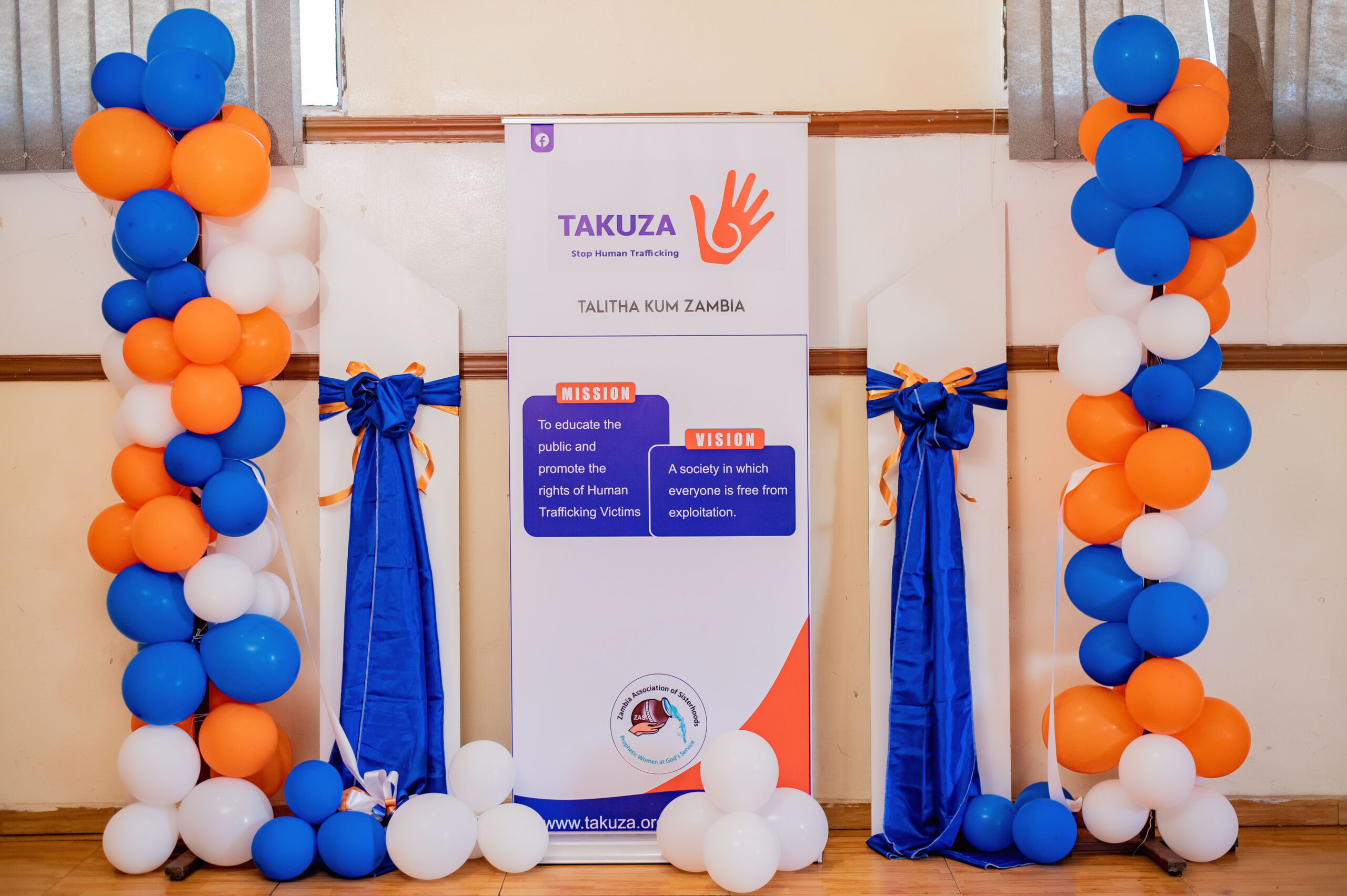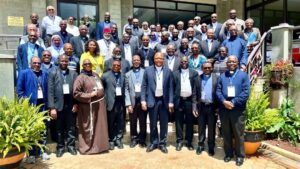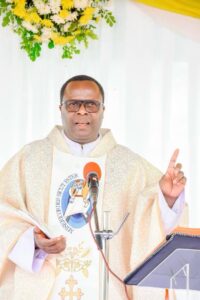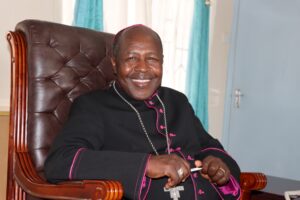ACWECA: ZAS Launches Counter-Human Trafficking Project

Sr. Helen Kasaka, LSMI
The Zambia Association of Sisterhoods (ZAS) has launched its counter-human trafficking project, Talitha Kum Zambia (TAKUZA). The project aims at ending human trafficking in Zambia and was launched at Mika Hotel in Lusaka on Thursday, April 27 2023.
ZAS is an association of Religious Women Congregations working in Zambia. It is committed to supporting women Religious in their formation and evangelisation mission by offering relevant programmes that meet spiritual and development needs. It was founded in 1958 and currently has a membership of 45 Congregations.
TAKUZA, on the other hand, is a faith-based national network whose vision is a society where everyone is free from exploitation. It is present in all provincial headquarters in Zambia and other districts where sisters are serving. TAKUZA is part of the story that began in 2009, in Rome, Italy, when the International Union of Superiors General established Talitha Kum International, a global network working to end human trafficking.
Speaking during the launch, TAKUZA Director Sr. Kayula Lesa said the Network was focused on addressing the information gap and economic empowerment for victims of human trafficking and the youth in Zambia who may be in situations of vulnerability. She explained that the project had raised awareness of human trafficking to 34,451 people countrywide in the last seven months.
Speaking at the same function, the Caritas Director Fr. Gabriel Mapulanga said human trafficking was evil and real. The vice, he added, was not only ensnaring to so many women and girls but also men and boys.
“Human trafficking is horrible. Pope Francis has stressed repeatedly that ‘human trafficking is an open wound on the body of contemporary society’,” Fr. Mapulanga also said human trafficking is a crime against humanity and an atrocious scourge that is present throughout the world on a broad scale.
He added that it is a phenomenon that exceeds the competence of any community and country. He commended TAKUZA for its efforts to collaborate with the Government through its various departments in sensitising the Zambian community on the issue of human trafficking as the battle cannot be won in isolation.
“All of us need to get involved in the fight. To eliminate human trafficking, we need a mobilisation comparable in size to that of the phenomenon itself,” he said adding, “And since its inception, TAKUZA has been doing a lot of work in ensuring that the masses are sensitised on the issue and it is amazing to see that other organisations are also working with the network,” he said.
Fr. Mapulanga was concerned with the increasing number of human trafficking cases that go unnoticed despite the clear recognition of the dimensions of the problem and the commitment being made by the Government, other institutions and individuals.
“We know that solemn commitments are necessary, but they are not enough. We must ensure, that our efforts are truly effective in the struggle against human trafficking. For the sake of those victims of the scourge, all of us who are engaged in this fight must do much better. The number of those enslaved has continued to grow, even here in Zambia,” he noted.
Fr. Mapulanga further said that there is a need to put more effort into prosecuting traffickers.
“We must do better to protect and assist victims. There should be more services in place to identify and liberate victims. We must do better to prosecute those involved in the crime of trafficking. There is a need to continue formulating adequate legal instruments to investigate, prosecute and punish traffickers,” he said.
Officiating the launch, the Ministry of Home Affairs and Internal Security Permanent Secretary Hon. Dickson Matembo in a speech read on his behalf by the Anti-Human Trafficking Secretariat National Co-ordinator Mr. Boris Mulengu said that human trafficking remains a huge challenge in Zambia due to the complexity of the issue, and the sophistication of traffickers.
Mr Mulengu indicated that the recent increase in cases of domestic human trafficking is of particular concern to the government, hence the need to enhance awareness across all sections of society.
“Traffickers treat human beings in a manner that commodifies and dehumanise their victims for personal gain. Therefore, Government has put in place measures to prevent human trafficking, protect victims and punish perpetrators,” he said.
Mr Mulengu expressed gratitude to TAKUZA for its efforts to end human through education, research and advocacy. He further observed that effective national response to human trafficking requires considerable amounts of partnership, encompassing the whole of Government and the whole of society which includes faith-based organisations such as ZAS.
“The Ministry of Home Affairs and Internal Security has opened the anti-human trafficking space to non-state actors, both Non- Governmental and Inter-Governmental to ensure a strong multi-faceted approach against the scourge of human trafficking,” Mulengu said.
Mr Mulengu said the launch of the TAKUZA was gratifying and an indication that ZAS intends to continue supporting Government efforts in alleviating the suffering of the most vulnerable members of our society, including victims of human trafficking, especially women and children.
For Talitha Kum networks around the world, the expression “Talitha Kum” has the transformative power of compassion and mercy, which awakens the deep desire for dignity and life which may be asleep and injured by the many forms of exploitation. The shared mission of TAKUZA and its network members is to end human trafficking. For this purpose, TAKUZA engages in education and advocacy and promotes initiatives that address the root causes of human trafficking and victims’ access to protection services.
Given the complex nature of human trafficking, TAKUZA’s approach to realizing its purpose is to work collaboratively with organizations and individuals committed to ending human trafficking. Human trafficking is the process of trading people for the purpose of exploitation. It involves the use of force, fraud, or coercion to obtain some type of labour or commercial sex act among others.
Every year, millions of men, women, and children are trafficked worldwide. Zambia is no exception and we learn from the Trafficking in Persons Report of 2021, that “most trafficking occurs within the country’s borders and involves traffickers exploiting women and children from rural areas in cities in domestic servitude or forced labour in agriculture, textile production, mining, construction, small businesses, such as bakeries, and forced begging”.
The project launch was a colourful event attended by 80 guests who included; the ZAS chairperson, representatives of UN agencies, embassies and CSOs, the Caritas Director, the Vicar for the Religious and Consecrated, Congregational superiors, Reverend Fathers, Religious men and women, and members of the press among others.


